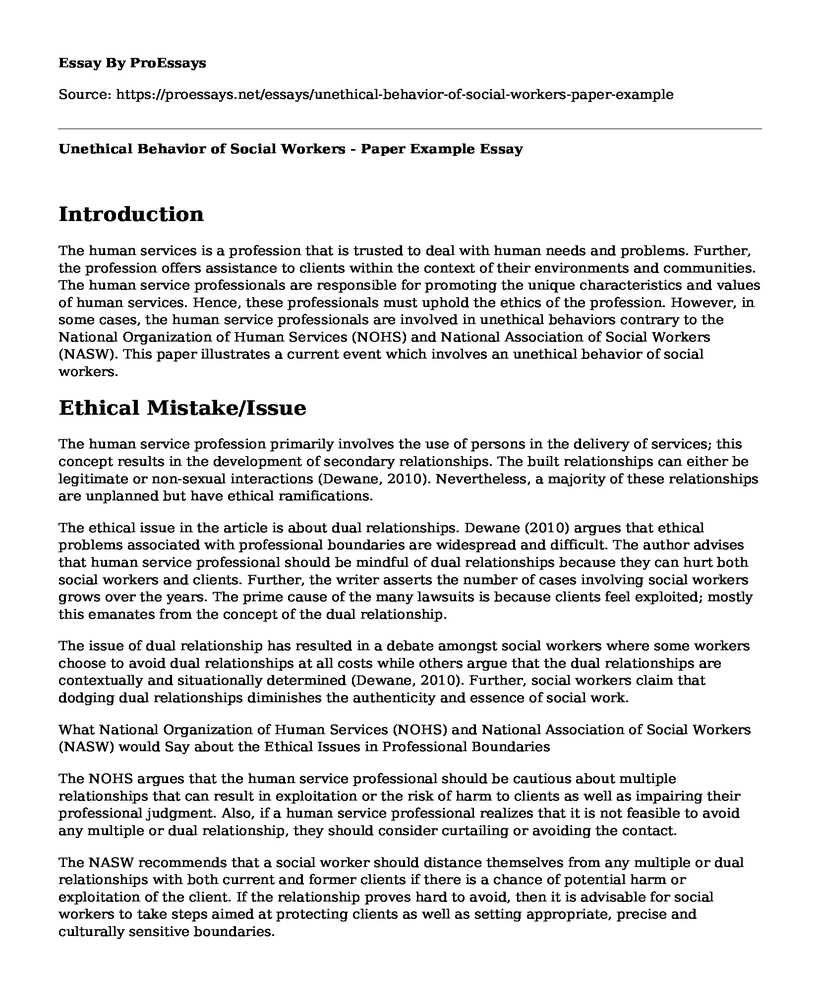Introduction
The human services is a profession that is trusted to deal with human needs and problems. Further, the profession offers assistance to clients within the context of their environments and communities. The human service professionals are responsible for promoting the unique characteristics and values of human services. Hence, these professionals must uphold the ethics of the profession. However, in some cases, the human service professionals are involved in unethical behaviors contrary to the National Organization of Human Services (NOHS) and National Association of Social Workers (NASW). This paper illustrates a current event which involves an unethical behavior of social workers.
Ethical Mistake/Issue
The human service profession primarily involves the use of persons in the delivery of services; this concept results in the development of secondary relationships. The built relationships can either be legitimate or non-sexual interactions (Dewane, 2010). Nevertheless, a majority of these relationships are unplanned but have ethical ramifications.
The ethical issue in the article is about dual relationships. Dewane (2010) argues that ethical problems associated with professional boundaries are widespread and difficult. The author advises that human service professional should be mindful of dual relationships because they can hurt both social workers and clients. Further, the writer asserts the number of cases involving social workers grows over the years. The prime cause of the many lawsuits is because clients feel exploited; mostly this emanates from the concept of the dual relationship.
The issue of dual relationship has resulted in a debate amongst social workers where some workers choose to avoid dual relationships at all costs while others argue that the dual relationships are contextually and situationally determined (Dewane, 2010). Further, social workers claim that dodging dual relationships diminishes the authenticity and essence of social work.
What National Organization of Human Services (NOHS) and National Association of Social Workers (NASW) would Say about the Ethical Issues in Professional Boundaries
The NOHS argues that the human service professional should be cautious about multiple relationships that can result in exploitation or the risk of harm to clients as well as impairing their professional judgment. Also, if a human service professional realizes that it is not feasible to avoid any multiple or dual relationship, they should consider curtailing or avoiding the contact.
The NASW recommends that a social worker should distance themselves from any multiple or dual relationships with both current and former clients if there is a chance of potential harm or exploitation of the client. If the relationship proves hard to avoid, then it is advisable for social workers to take steps aimed at protecting clients as well as setting appropriate, precise and culturally sensitive boundaries.
What to do in a Similar Situation
As a human service profession one may find himself or herself in a dual or multiple relationships with a client as a result of the nature of the work and the client's vulnerability. For Instance, one might attend a funeral of a hospice patient or share a meal in a family-based treatment visit. However, harm or exploitation of the client is what makes dual or multiple relationships deceptive. Therefore, one should aim to protect clients and demonstrate proper standards of boundaries and care. Alternatively, one should handle each situation with professionalism. For instance, bartering, dating or entering into business arrangements with clients are a few examples of situations that one can avoid.
Response to the Article
The author has shared most of the information about the concept of professional boundaries, especially dual and multiple relationships with the clients. Additionally, the author has cited examples that may facilitate or compromise the relationship between human service professionals and their clients. However, it would be important for one to understand that the dual or multiple connections arise when the human service professionals engage in more than one relationship with the client whether business, professional or social. Moreover, the multiple or dual relationship can occur consecutively or simultaneously.
One may question how the NOHS and NASW address the ethical dilemmas brought about by dual and multiple relationships. For instance, a situation where a human service professional pursues his or her practice in a rural setting where one owns the only business in the area but still is a social worker. Does this mean that one should not carry out the business with the client to avoid being in dual or multiple relationships? At times one may unwillingly cross the professional boundaries.
Conclusion
Naturally, human beings are social, and constant interaction between individuals gives rise to relationships of any kind. However, the situation in the human service profession is different where one should take caution about the interaction with the client because more than one relationship may be termed as unethical behavior. The discouragement of the dual or mutual relationship between human service professionals and clients is meant to prevent harm or exploitation of clients. Hence, the need for the National Organization of Human Services (NOHS) and National Association of Social Workers (NASW) in ensuring the code of ethics in the human service profession.
Reference
Dewane, C. J. (2010, January/February). Respecting Boundaries- The Don'ts of Dual Relationships. Retrieved from Social Work Today: http://www.socialworktoday.com/archive/012610p18.shtml
Cite this page
Unethical Behavior of Social Workers - Paper Example. (2022, Jul 21). Retrieved from https://proessays.net/essays/unethical-behavior-of-social-workers-paper-example
If you are the original author of this essay and no longer wish to have it published on the ProEssays website, please click below to request its removal:
- Are Radiographers and Other Professionals Safe When Operating an O-arm Imaging System in a Surgical Room?
- Health Effect of Radiation Essay
- Amoxicillin Paper Example
- Eclampsia: Causes, Risk Factors, & Seizures in Pregnant Women - Essay Sample
- Research Paper on UCSF Liver Transplant: A Second Chance for Life-Saving Care
- News Reporting: An Essential Service to Society - Essay Sample
- Essay Sample on Reality TV: Impact on Society & Goals it Seeks to Achieve







